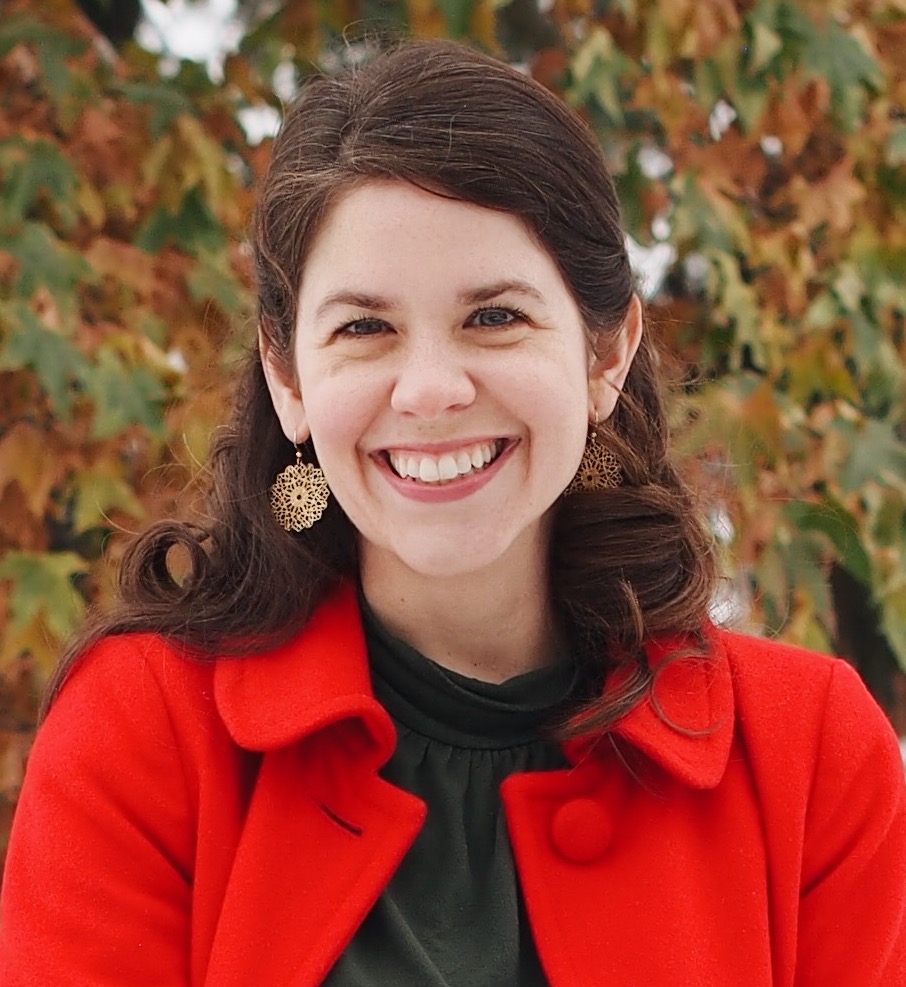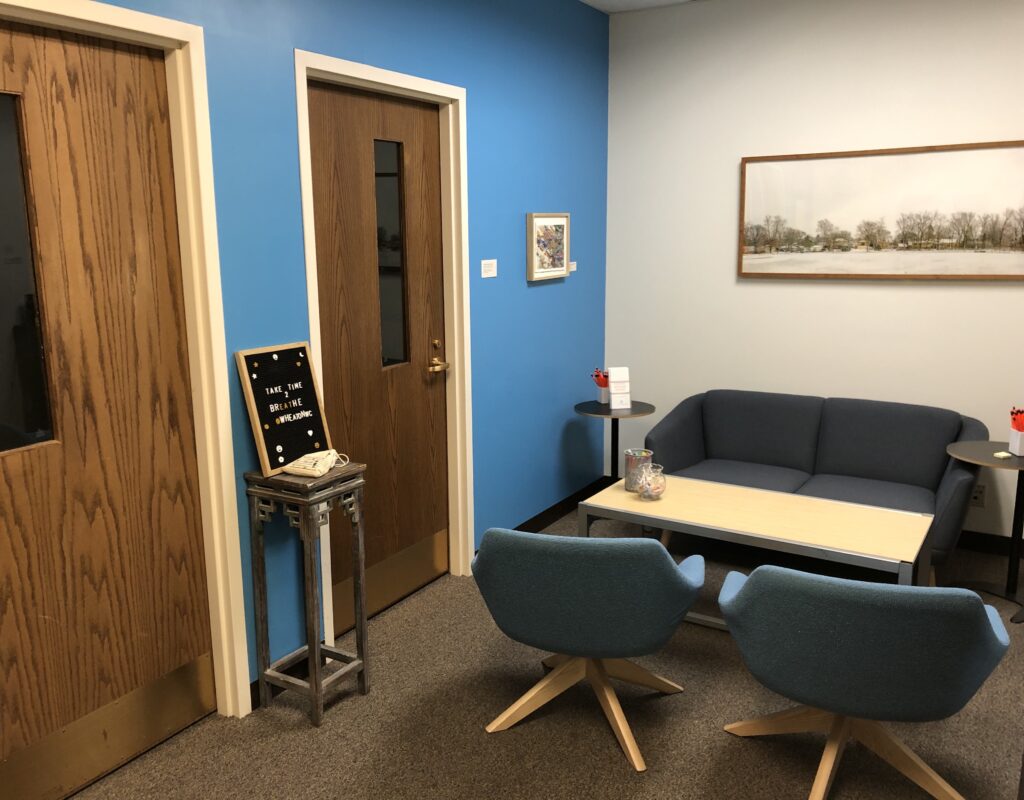I have an adage in my life: when one has an excuse to chat with Dr. Alison Gibson, one should not pass on the opportunity! Thankfully, I recently had the wonderful chance to interview Dr. Gibson, Director of the Writing Center, about her history with writing centers, her experiences expanding the one at Wheaton, and her vision moving forward.
Sarah Danielson (SD): Let’s start at the beginning. Generally speaking, how did you get started at writing centers?
Dr. Alison Gibson (AG): I went to graduate school at the University of Virginia (UVA). The UVA Writing Center is exceptional and is a hub for writing pedagogy. The Writing Program there is led by Greg Colomb, who co-wrote influential books in Writing Studies like The Craft of Research and The Craft of Argument. There, I loved that the teaching of writing had a lot to do with educational theory and child development, asking questions like “How does the brain work?” While there, I taught First-Year Writing and then applied to work at the Writing Center. That was a cool experience. The students had a broad range of writing levels, but I eventually became the person everyone came to for grad school. Everyone told each other, “Oh, you should work with her,” so I saw everyone’s personal statement [laughs]. That was cool because I developed a kind of niche.
Then, there was a position at UVA to become Director of the Writing Center and oversee all grad students who taught First-Year Writing. Mr. Dr. Gibson and I got hired at the same time, and we had to pick between the jobs. We came here. At that point, I thought, “Maybe I’m giving this up, this will never happen.” But then I got hired at Wheaton too, and when Dr. Davis retired from directing the Writing Center, he asked me to direct it. It was an honor because he was entrusting me with this thing he had built for 20 years.
SD: Did Dr. Davis start the Writing Center at Wheaton?
AG: Dr. Coolidge started it. The old story is that it started in a closet in Blanchard, then moved to where it is now. At first, it was shared with IDS (Interdisciplinary Studies), because Dr. Davis oversaw both programs. When Dr. Davis asked me to lead the Writing Center, it was such a gift because I had given up on the dream. It was so lovely that he remembered that I had that passion and trusted me with it.

SD: That’s amazing. So, how did you see the Writing Center expand under your control?
AG: The staff was smaller when I took it over, around nine people. The first thing I wanted to do was grow the staff to at least 20 people so we could have people from all different majors. A big priority of mine was racial diversity and gender diversity. Because Dr. Davis had kept it small, he didn’t really advertise when he was hiring. He just asked around the English Department or people in his classes. When I knew I wanted people from the sciences, I had to email faculty, like “Can you recommend a really great writer who you think would be great for this?” That’s the first big way we started expanding.
The second way was renovating the space, which was an ongoing project. It was so dark in there, the walls were all a neutral color, and the consultation rooms had dark wood bookshelves covered in remnants of when the Writing Center did everything on paper. The lobby area had old, hand-me-down furniture. We just cleaned out the space and advocated for money to renovate. Phase One was painting it and getting the old stuff out. Phase Two was when IDS moved out and we got all new furniture. The first set of art we got is from Special Collections, and the second set came from the President’s Art Collection.
SD: I love it in there. It’s very aesthetic!
AG: I felt like, first of all, it’s hard to find the Writing Center physically. And then if you come in there and it’s not nice and inviting, why would people want to come back? While renovating, I got to do tons of fun research about Writing Center design! Some scholars thought the Writing Center should look like an academic space, so it should look like a classroom. Some felt it should be like a home with comfy couches and lamps, creating a safe space. Some were into the idea of a creative space with legos everywhere. I was trying to find a way to merge visions, making a creative academic space that would fit well in the library.

Our third big expansion project was to create a professional development plan for the staff. I wanted the consultants to feel like they were building promotable strengths, or skills they could talk about with a potential employer. I wanted it to feel like there was room for them to get promoted so that, as years go on, they could gain more responsibility (like as Writing Fellows, Senior Consultants, etc.).
SD: I appreciate all the renovation! I feel like I would have been stressed out in a musty space [laughs]. I also appreciate the promotable strengths. I want to get hired! [laughs]
SD: So, do you have a vision for how you want the Writing Center to continue in the future?
AG: The main thing I’m thinking about for these next couple of years is how we can reach other groups on campus that we aren’t reaching as effectively. Right now, our strongest connection is with First-Year Writing and First-Year Seminar, but we’ve started to make other connections. We’ve been partnering more with ISP (International Student Programs) and grad school, and we partnered with Athletics a few years ago. In the past, we actually went to the weekly football study halls and set up. That was a cool partnership. The more groups I can connect with, the more people talk about us. So, I ask myself, “What is another group we can reach and make connections with?”
The Writing Center is about welcoming people you don’t know and welcoming the stranger, which is literally what hospitality is.
SD: As you’ve been at UVA and now here, how has your Writing Center theory grown and developed? In what ways has it changed?
AG: UVA is a secular institution, so a lot of language about writing pedagogy that I was taught was more secular. That includes writing as a form of self-expression, critical thinking, and empowerment. All of those things are true, but once I got to Wheaton, I was invited to think about what it means to be a Christian who cares about writing and writing pedagogy. It was really here that I started researching hospitality. The Writing Center is about welcoming people you don’t know and welcoming the stranger, which is literally what hospitality is. It’s also about doing collaborative work with someone, which requires hospitality. This concept opened up our idea of what this space should be: a space where lots of different people are welcomed. And then it meant that we as consultants had to talk about what it meant to have a hospitable orientation toward someone else and their writing.
The book Charitable Writing is so beautiful in thinking about writing as a spiritual practice. The broader language of Writing Center pedagogy is that you’re not correcting the paper. You’re trying to inform the person. Beyond that, in the context of Wheaton, it’s about coming alongside someone as they develop spiritual practices as a writer. How can writing help you cultivate self-control, humility, and patience? I never would have thought about writing that way if I hadn’t been at Wheaton.
SD: I love it. I’m just curious, is there a specific theorist that influenced you most?
AG: The hospitality person is Henri Nouwen. He’s just the best [laughs]. In Christianity, hospitality is really rooted in seeing the other person as created in the Image of Christ. So then, any act of hospitality extends from that. If you don’t believe that, your hospitality can still be meaningful, of course, but it just comes from seeking to know the Other, being curious about other people, or thinking all cultures matter.
I was always interested in hospitality because I was a really shy child who was afraid to make mistakes in front of others. When I teach, working one-on-one with a student, I remember that part of me. A lot of things people did while trying to be hospitable weren’t. This wasn’t because they weren’t trying, but because they were expressing their hospitality in ways they would receive it. Then, I started reading about making space, which is all about saying, “This space is whatever you need it to be.” That’s when it made sense to me. There’s room for whatever you want in here. Sometimes that’s listening. Sometimes it’s talking. Sometimes it’s something else.

SD: Do you have a favorite memory from the Wheaton Writing Center? Or one that was pivotal or formative?
AG: There were two summers near the beginning when the Student Manager worked with me all summer as an intern. The summer Maggie Rothrock worked with me, she started researching training resources. She said, “I really like reading about Writing Center pedagogy,” so I said, “You should think about grad school.” That was a lightbulb moment. As a teacher, I love that all I did was point out to her her passion, and now she’s in grad school preparing to do it. I remember thinking the Lord placed her in the right place so she could cultivate that gift.
Now, since I don’t do consultations, my best memories are of us at staff meetings. The staff is comprised of my favorite people, so it’s like walking into the room with people you absolutely love and admire. Every time I walk into a room with you all, I think “I want to stay here, I would just like to be here with these people.”
SD: Thank you, Dr. Gibson! I feel the same way about spending time with you [laughs]. We appreciate all the work you do at the Writing Center!
This interview was edited for brevity and clarity.